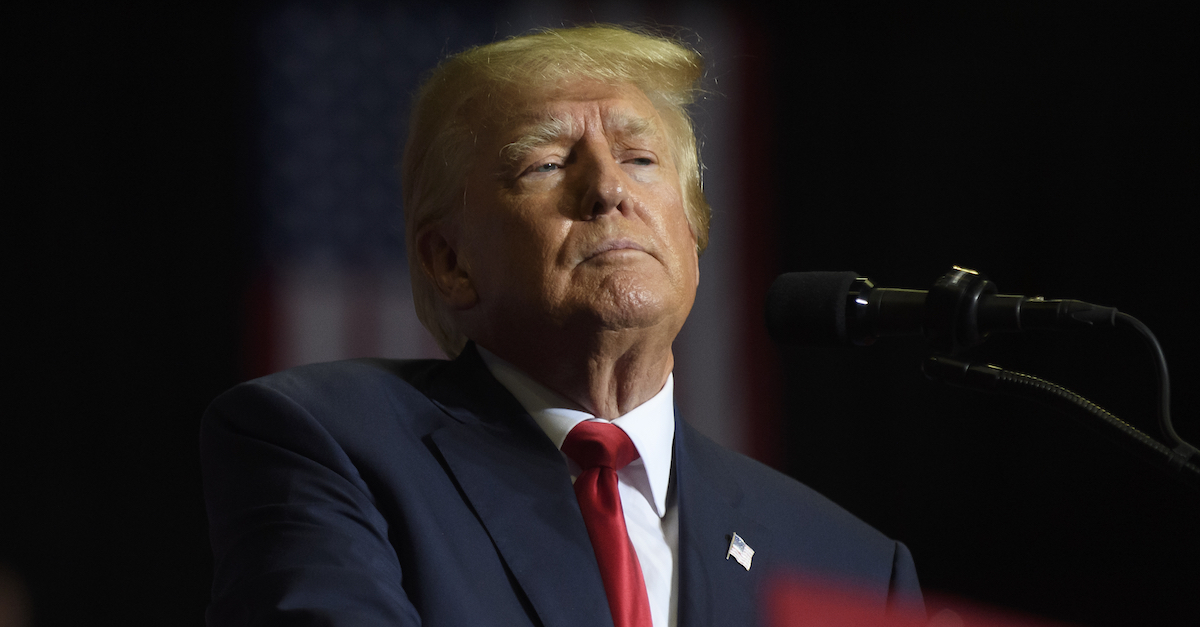
Former President Donald Trump speaks at a rally at the Covelli Centre on September 17, 2022 in Youngstown, Ohio. (Photo by Jeff Swensen/Getty Images.)
The U.S. Department of Justice on Tuesday filed a proposed judicial protective order — in essence, a secrecy pledge — for Donald Trump’s attorneys, their staff, and any associates who might be involved in a review of materials seized from Mar-a-Lago on Aug. 8.
The document has not yet been signed by Judge Aileen M. Cannon, who is overseeing the proceeding, but it is fashioned as an order of the court with a signature blank for the judge to utilize if she so chooses.
The document notes that Judge Cannon’s order to appoint Judge Raymond Dearie as a special master to review some of the seized materials for claims of privilege “requires the government to provide copies of materials seized . . . to the Special Master, Plaintiff’s counsel, and certain agents and employees” of Trump’s attorneys.
“The Seized Materials are evidence in a criminal investigation case, most of whose details are not a matter of public record,” the DOJ stressed. A protective order would “preserve the confidentiality of non-public information and protect the special-master-review process.”
The language employed is similar to words used by the DOJ in a separate appellate filing on Friday. In that document, the DOJ balked that Judge Cannon had “entered an unprecedented order enjoining the Executive Branch’s use of its own highly classified records in a criminal investigation with direct implications for national security.”
Such protective orders are commonplace in many sensitive criminal cases.
The proposed order expressly would require the following, according to its terms:
The Seized Materials produced by the government are confidential and shall be disclosed to no one other than the Special Master, his law clerks, admitted Plaintiff’s counsel of record in this case (“Plaintiff’s Counsel”), staff supporting Plaintiff’s Counsel (such as paralegal assistants, secretarial, stenographic, and clerical employees) who are working on this case under the direction of Plaintiff’s Counsel and to whom it is necessary that the Seized Materials be disclosed for purposes of executing this Court’s orders, and vendors approved by the Special Master or this Court for purposes of scanning, hosting, reviewing or otherwise processing electronic copies of Seized Materials.
Plaintiff’s Counsel shall provide the government with the names and job titles of any staff who Plaintiff’s Counsel propose to review Seized Materials at least two business days before Seized Materials are shown to such persons and such persons must execute the “Acknowledgment of Protective Order” that is attached to this Judicial Protective Order at Exhibit A. If the government objects to disclosure during such two-day period, no Seized Materials may be disclosed until the government’s objection is resolved by the Court.
Vendors who are engaged to scan, host, provide review, or otherwise process the electronic copies of the Seized Materials must also sign execute the “Acknowledgment of Protective Order” that is attached to this Judicial Protective Order at Exhibit A.
The proposed protective order naturally contains a promise not to disclose the materials for purposes unrelated to the proceeding at hand; it also states that court documents which reference the materials shall be filed under seal:
Plaintiff’s Counsel, their staff, and any vendors shall use Seized Materials exclusively in connection with the above-captioned case and not for any other purpose. Nothing herein shall prevent a party from using Seized Materials as exhibits to pleadings or otherwise, or from referring to, quoting, or reciting from Seized Materials in connection with pleadings or motions filed in the above-captioned case; provided, however, that any such Seized Materials be filed under seal or submitted to the Special Master or Court for in camera inspection.
Also included in the proposal is a suggested promise to keep the materials stored securely, a provision which requires notifications to the court if materials are “inadvertently or otherwise” disclosed, and a warning that violations “shall be punishable by contempt of court or any other legally available sanction that the Court deems appropriate.”
A footnote indicates a key distinction: the proposed order does not govern materials bearing classification markings. The government doesn’t want to turn that material over just yet because a request for a stay in a portion of the contemplated handoff is currently before the 11th Circuit Court of Appeals. If a stay is not granted, a separate protective order will be promulgated for classified material:
The government contends that Seized Materials with classification markings should not be provided to the Special Master or Plaintiff’s counsel and has pending before the United States Court of Appeals for the Eleventh Circuit an application for a stay pending appeal. If the Eleventh Circuit stays this Court’s order with respect to documents with classification markings, this Judicial Protective Order will govern Seized Materials without classification markings. If any classified materials will ultimately be provided to Plaintiff’s counsel, then the parties will propose a separate judicial protective order for the Court to enter concerning documents with classification markings that is similar to a protective order pursuant to Section 3 of the Classified Information Procedures Act, 18 U.S.C. App. III § 3.
Trump’s attorneys have repeatedly challenged the government’s notion that some of the documents are classified. However, they’ve also refused to directly argue whether they consider the material declassified.
A copy of the proposed order is here: